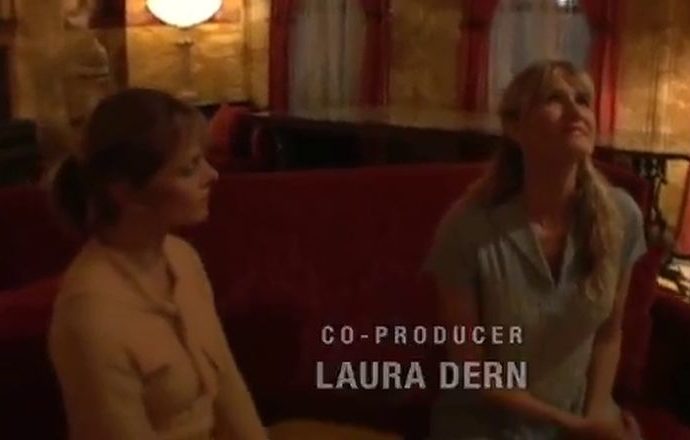Dir: David Lynch
Star: Laura Dern, Jeremy Irons, Justin Theroux and, barely, Nastassja Kinski
My relationship with the works of David Lynch over the years has been rocky. Blue Velvet is great, with a huge vote of thanks to Dennis Hopper’s berserk performance. Lost Highway is also very good (and introduced me to Rammstein, for which I’ll be forever grateful). But Eraserhead is likely near the top of my list of most over-rated movies of all time: I find it an almost unwatchable piece of self-indulgent arthouse nonsense. Empire is a little bit like each of the above, but eventually topples over into incoherence masquerading as art. And from the Kinski perspective, it’s a cruel and extremely long-winded joke.
The “plot” – and rarely have quotes been used as deliberately – concerns actress Nikki (Dern), who has won a leading role in a film-within-the-film, On High in Blue Tomorrows, being directed by Kingsley Stewart (Irons) and opposite leading man Devon Berk (Theroux). Almost immediately, the lines between Nikki and her character, Sue, begin to blur, and reality takes a back seat. An early morning rehearsal is interrupted by an unidentified visitor to the sound stage, whom Devon chases and who suddenly vanishes. Sue’s on-screen affair with Devon’s character, Billy, begins to impact the actors’ relationship. And later, when walking to her car, Nikki sees a door in a wall and feels impelled to go through it. She finds herself back on the sound stage watching herself in the previous rehearsal, having become the unidentified visitor.
To this point, it somewhat echoes Lost Highway, with the concept of time being a loop of some kind. However, from here on, you’re no longer so much following the story, as desperately clinging on to it. There’s absolutely no way I can summarize it or even explain it, in any way that will make sense. I’m not even convinced Lynch could do so, and it’s safe to say that the film is very – indeed, almost entirely – open to personal interpretation. It doesn’t help that Lynch is in no hurry to get wherever it is he’s supposedly going, with the film running a hair short of three hours. It likely took me nearer six hours to get through it: I’d watch 30 minutes or so, then have to take a break, and come up for mental air. Admittedly, it perhaps didn’t help that the copy I watched offered no subs for the significant chunks in Polish. But I’ve a feeling that was hardly the deal-breaker.
By the time I got to the fourth installment, without any sign of Kinski, I was beginning to wonder if I’d dozed off and missed her. Or blinked, for there are some cameos that last only a few seconds, such as William H. Macy as an announcer. Perhaps she was one of the rabbits. No, seriously. For one aspect is scenes that appear to be a parody of a situation comedy, involving three rabbit-headed humans, like something out of Donnie Darko. They inhabit a living-room (into which Nikki/Sue later stumbles), exchanging bizarrely meaningless lines like “There have been no calls today,” interrupted by a nonsensical laugh-track. But on checking, nope: the two female rabbits are actually voiced by Naomi Watts and Laura Harring, the stars of one of Lynch’s previous mind-melters, Mulholland Drive.
Finally, six minutes before the end, as the final credits roll, we get Nastassja’s “contribution”. Again, quotes used advisedly, because here’s the description of it, taken directly from Wikipedia: “The concluding scene takes place at [Nikki’s] house, where she sits with many other people, among them Laura Harring, Nastassja Kinski, and Ben Harper [Dern’s husband at the time]. A one-legged woman who was mentioned in Sue’s monologue looks around and says, “Sweet!” Niko, the girl with the blonde wig and monkey, can also be seen. The end credits roll over a group of women dancing to Nina Simone’s Sinner Man while a lumberjack saws a log to the beat.” It’s every bit as incomprehensible as it sounds. Kinski has no lines, and indeed, is barely glimpsed in the whole sequence, save for the screen capture shown at top. The words “Is that it?” may have escaped my lips at the end of this one.
It appears Lynch did originally plan to include more about Kinski and her character – referred to as ‘The Lady’ on IMDb but credited, along with Harring, only as “Special Appearance by”. The supplemental film, More Things That Happened, released as an extra on the DVD release of Inland Empire, is a 75-minute slab of various deleted scenes which were edited out of the original movie. But to be honest, the tiny fragment of Kinski which is left, little more than a single shot lasting a couple of seconds, could have been excised entirely, and would hardly have harmed the artistic integrity of the remainder. [It would certainly have saved me from wasting a holiday afternoon] Perhaps there was some kind of contractual obligation here: part of the agreement for Nastassja’s appearance, was that she was guaranteed to be in the finished movie? I’m just guessing.
Despite my grumpy comments above, I can’t truly say the experience was entirely unpleasant, even if Dern’s acting appeared to consist of pretending she was smelling raw sewage for the entire movie. Say what you like about Lynch, he has a vision, and goes full-throttle towards realizing it. Such a cheerful disregard for the audience can only be admired, albeit somewhat grudgingly. The results have a hallucinatory quality to them, like being stuck inside a nightmare. And not just yours, but someone else’s, where there’s not even anything to which your subconscious can relate. I guess, I just prefer my nightmares to be a little better-defined, in terms of plot structure.
